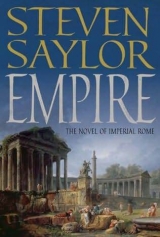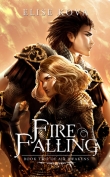
Текст книги "Empire"
Автор книги: Steven Saylor
Жанр:
Исторические приключения
сообщить о нарушении
Текущая страница: 43 (всего у книги 45 страниц)
AD 132
Hadrian was back in Roma.
After years of travel, the emperor’s return to the capital was to be marked with celebrations and banquets. But his very first excursion, bright and early on the morning after his first night back in the imperial palace, was an unannounced visit to the site of the Temple of Venus and Roma, to see what progress had been made in his absence. When the emperor was informed that Marcus Pinarius was not present, being occupied that morning at his workshop, Hadrian and his retinue headed directly to the Aventine Hill.
Marcus and his assistants were busy piecing together some sections of the gigantic bronze statue of Venus that was to be installed in the temple. When Amyntas came running in to announce that the emperor was in the vestibule, Marcus told everyone to cease working and stay exactly where they were. He put down his tools and dusted off his tunic. Amyntas, checking Marcus’s appearance, flicked some bits of metal from his beard.
Impeccably dressed as always, the emperor made a cursory examination of the statue, then suggested that the workmen might be allowed a rest, so that he and Marcus could speak in private.
“I’ve just come from the temple,” said Hadrian. “I’m pleased with the progress. You’ve done well, Pinarius.”
“Thank you, Caesar. I’m but one of the many artisans and engineers who are privileged each day to carry out the emperor’s grand vision.”
“You needn’t be so modest, Pinarius. I’ve spent a lifetime dealing with architects and artists all over the world. You may be the most talented of all.”
Now that Apollodorus is dead, Marcus thought. Then he thought of the other death that had occurred in the course of Hadrian’s journeys. During the trip up the Nile, Antinous had drowned.
It seemed to Marcus that the emperor had aged considerably since he had last seen him. There was more silver in his hair and his beard was now almost entirely grey. His face was more wrinkled. He spoke more slowly and with a quaver in his voice. His eyes were dull. Some essential spark had gone out of him.
Hadrian strolled around the studio, touching the various implements. “You spent so many hours with him here, in this room – alone with him, looking at him, observing him. More than anyone else on earth, except myself, you must remember what he looked like.”
“Caesar speaks of Antinous,” said Marcus quietly. “When I learned of his death, I wept.” It was true. Marcus had grieved, not so much for the youth himself, whose personality had remained a mystery to him, but for the loss of so much beauty. In his mind, there was still some mysterious link between the Bithynian youth and the god who visited him in dreams. The death of Antinous had struck him as more than the death of a single mortal; his passing was emblematic of the death of all things.
“Do you know the circumstances of his death?” said Hadrian in a whisper.
“I know only what everyone knows, that Antinous drowned in the Nile.”
“Egypt cast a spell over us – the heat, the buzzing insects, the oozing mud, the endlessly flowing river, the temples filled with strange symbols and animal-headed gods, the gigantic monuments from some unimaginably distant past. As we journeyed farther and farther up the Nile, we were gripped by some nameless, ancient dread.
“As I had explored the Mysteries of Eleusis, so I was initiated in the secret rites of the Egyptians. When the priests looked into my future, they saw something terrible. They declared that my life was over, that I would die in a matter of days, unless… unless another life was sacrificed in my place.
“I didn’t want to believe them. But when I cast my horoscope, adjusting the reading for the greater influence of the southern stars, I saw they were right. I was in great danger. Death was very near.”
Marcus drew a breath. “So Antinous…”
“He sacrificed himself in my place. I never asked him to do it. I was restless that night. I heard him leave the cabin. I heard the soft sound of a splash. I was half asleep and thought I was dreaming…”
Marcus remembered the story Antinous had once told him, in this very room, about the time Hadrian and the boy hunted a lion. If Caesar hadn’t killed the lion, it would surely have torn me to pieces. Caesar saved my life. I can never repay him for that.
The boy had been able to repay him, after all.
“What Antinous did was not the act of a mere mortal,” said Hadrian. “I always sensed there was something divine in him. I think you sensed that, too, Pinarius. But I never truly understood the nature of his divinity until he left this world. In his honour I built a city on the Nile, where I consecrated a temple and appointed priests to worship him. In Ephesus and Athens, on the way back to Roma, I built more temples in honour of the god Antinous.”
Marcus had heard about the emperor’s activities on behalf of the new god. The grandiosity of Hadrian’s grief was the talk of Roma; some dared to ridicule it, but others were in awe of it. Marcus had heard it compared it to the madness of Alexander the Great after the death of Alexander’s lover, Hephaestion, but it was hard for Marcus to look at the aging, paunchy Hadrian and see any resemblance to the dashing, doomed figure of Alexander.
“There will be no temple to Antinous here in Roma,” said Hadrian. “Just as worship of the emperor is not required of citizens within Italy, so I will not ask the people of Roma to worship the youth who was my consort. But I plan to build a tomb for Antinous near the town of Tibur, east of the city. I also plan to build a residence there, a place where I can retreat from the world.” Hadrian closed his eyes for a long moment, then opened them. “Naturally, Pinarius, I want you to be part of those projects.”
“Of course, Caesar. I’ll do whatever I can.”
Hadrian stepped closer. He gazed steadily into Marcus’s eyes. “What I really want, dear Pygmalion, is for you to sculpt Antinous.”
Marcus stared back at him. Had grief erased the emperor’s memory?
Hadrian smiled wanly. “I understand your hesitation, Pinarius. Let me explain. Temples have been erected. Temples must have statues, so artists in Egypt and Greece have sculpted images of the Divine Antinous. At best, these statues have been – what word can I use? – acceptable. But none has captured the divine essence of Antinous. I’m convinced that only you – because you alone sculpted him in life – can possibly do that. I want you to make a statue of Antinous. We’ll collaborate on this project, you and I, working from memory.”
Marcus felt many things at once – doubt, dread, and a twinge of anger, but also a thrill of excitement such as he had not experienced in a long time.
Hadrian looked at him with a plaintive expression. “I don’t suppose… when I told you to destroy the statue…”
“I did as I was ordered, Caesar. I burned my sketches. I destroyed the models. I broke the arms and legs from the statue, smashed the torso, pulverized the hands and feet – ”
Hadrian winced and shut his eyes.
“But…” Marcus hesitated for a long moment, then decided to tell the truth. “I kept the head.”
Hadrian’s eyes grew wide.
“It was the most beautiful thing I ever made, or ever could hope to make,” said Marcus. “I couldn’t bear to destroy it.”
“Where is it?”
Marcus walked to a cluttered corner of the workshop. Hadrian followed him. Marcus cleared away a pile of implements and tattered scrolls to reveal a small cabinet covered with dust. The iron latch was rusty. Marcus had not opened the cabinet in years. It would have been too painful to look at the object it contained.
He managed to open the latch. He reached into the cabinet. He stood and held aloft the head of Antinous.
Hadrian gasped. He took the head from Marcus and held it in his hands. He touched his lips to the marble. His eyes filled with tears.
In the days and months that followed, the emperor spent every spare moment with Marcus in the workshop, surrounded first by drawings and small clay figurines, then by life-size models. Together they strove to recreate, to Hadrian’s satisfaction, the true image of Antinous. Marcus drew and moulded, and Hadrian gave his critiques, circling the life-size models, touching them and closing his eyes as if to summon up tactile memories, telling Marcus to make the chest larger, or the nose slightly longer, or the curvature of the calves more pronounced.
Having sculpted Antinous from life, Marcus trusted his memories of the youth’s appearance; sometimes Hadrian’s suggestions struck him as dubious, but Marcus did as he was told. Hadrian was pleased, and sometimes so shaken by the verisimilitude of the image that he wept. Strangely, to Marcus, their collaborative creation seemed to resemble more closely the god of his dreams than his recollection of the living Antinous.
At last came the day of the unveiling.
The statue would present no surprises to Hadrian, since he had overseen its creation from conception. Nonetheless, Marcus wished to make a formal unveiling, more for the benefit of his son than for the emperor. But young Lucius was late. Hadrian arrived ahead of the boy, but he did not seem to mind waiting. He strolled about the workshop, fiddling with various objects and taking deep breaths.
“Caesar has much on his mind today,” observed Marcus. The two of them had grown increasingly comfortable in each other’s presence. Hadrian now regularly unburdened himself to Marcus.
“The Jewish revolt,” said Hadrian. It was the problem that most preoccupied him these days. “It’s like the hydra: cut off one head and two more take its place. People continue to die by the tens of thousands. As long as a significant number of Jews persist in their belief that this fire-brand Simon Bar Kochba is their long-awaited Messiah, there seems to be no way to suppress the revolt, short of complete extermination, of the sort that Trajan practised in Dacia. But that’s not possible in the case of the Jews; they’re scattered all over the empire. The only long-term solution is to somehow assimilate these people, whether they wish to be assimilated or not. Towards that end, I’ve enacted a ban on their practice of amputating their foreskins. For reasons which defy comprehension, they attach some religious significance to this barbaric procedure. It’s yet another way by which they deliberately set themselves apart. For their own good and to put an end to these insurrections, they must put aside their primitive religion and embrace the true gods, like the rest of the world.”
“I understand you’ve renamed the province,” said Marcus.
“The region that was Judaea is now to be called Syria Palestina, just as Jerusalem is now Aelia Capitolina. These things make a difference – names and symbols and such.”
“And Caesar’s problems with the Christians?” said Marcus. This was another concern occasionally mentioned by the emperor.
Hadrian scoffed. “My travails with the Christians are as nothing compared to the trouble stirred up by the Jews. Some of my advisers lump the two groups together, but such thinking is ignorant and out of date; a great many Christians are not and never were Jews. Like the Jews, their atheism sets them apart from their neighbours, but unlike the Jews, they seem to be quite meek; meekness is actually a part of their teachings. As long as their numbers remain small and they keep their heads down, I think Trajan’s policy of ‘ask not, tell not’ is best.”
“What does that mean, exactly?” said Marcus, to whom this dictum had never quite made sense.
“It means that Roman magistrates take action against the Christians only when there is a formal complaint against them. No complaint, no action.”
“That would seem to put a great deal of power in the hands of their neighbours,” noted Marcus.
“If the Christians persist in their perversity, then they must live or die at the discretion of the decent, law-abiding majority.” Hadrian put down the clay model he was examining and raised an eyebrow. “Wasn’t one of your relatives a Christian?”
“I hardly think so,” said Marcus with a laugh. His denial was genuine. Marcus had never been told about his Christian great-uncle.
“Oh, no, I’m quite sure about this,” said Hadrian, who had reviewed every aspect of the imperial dossier on Marcus when he was deciding the fate of Apollodorus. “As a matter of fact, isn’t that talisman you wear some sort of Christian amulet? I’ve always presumed it was handed down from the Christian in the your family, and worn by you for sentimental rather than religious reasons, since you yourself clearly are not a Christian.”
“A Christian symbol? My fascinum? Certainly not!” Marcus touched the fascinum. “This heirloom was given to me by father in the presence of yourself and the Divine Trajan. The fascinum long predates the first appearance of the Christians.”
“Calm yourself, Pygmalion! Perhaps I’m mistaken about your amulet. Nonetheless, I can assure you that the brother of your grandfather was indeed a Christian. I can’t recall his name at the moment, but I know for a fact that he was executed by Nero after the Great Fire. It must have been quite a scandal at the time. That’s probably why you never heard about it. Families have a way of falling silent about the scandals in their past; the children are the last to find out, if they ever do. If you don’t believe me, ask your friend Suetonius the next time you see him. In his research, he’s certain to have come across the Pinarius who was a Christian.”
“With respect, Caesar, Suetonius is not my friend,” said Marcus, flustered and taken aback by these revelations.
“No? Didn’t Suetonius send you a personally inscribed copy of his imperial biographies?” Was there anything Hadrian didn’t know, thanks to the vast network of imperial spies?
Marcus cleared his throat. “Yes, Suetonius sent me a copy – but I didn’t ask for it, and I swear I’ve never read it.”
“No? You should. It’s not bad. Rather smutty, but I suppose the salacious details are what keep most readers scrolling forward. Ah, but I think your son has finally arrived.”
They turned at a sound from the vestibule. Amyntas entered first, looking a bit shame-faced from fear that Marcus would blame him for the delay. Before he could speak, Apollodora swept into the room, wearing her best stola. She had never forgiven Hadrian for the death of her father, but in his presence she had been careful never to show a trace of bitterness. She was followed by Lucius, who at eleven was very big for his age, almost as tall his father. Lucius’s green eyes and fair hair had come from Marcus, but his build seemed to have come from his grandfather Apollodorus.
Glad to leave behind the emperor’s unsettling revelations about a Christian relative, Marcus proceeded with the unveiling. He strode to the statue and pulled away the sailcloth.
Hadrian seemed to see the statue as if for the first time. He gazed at it for a long time, then reached out to touch it. Marcus saw on his face the same expression of awe he had displayed when he first saw the Melancomas statue, long ago.
“You captured him, Pinarius,” Hadrian whispered. “You’ve done the impossible. Now you must do it again.”
“Again, Caesar?”
“We must make more images. Each slightly different, so as to capture different aspects of his divinity, but all as true to life as this one. They can serve as models to the others who will make images of him all across the empire. Are you up for it, Pinarius?”
“Nothing would please me more, Caesar,” said Marcus, with a quaver in his voice. The prospect of dedicating his time and talent to the creation of more such images – which to Marcus were as much an expression of devotion to his dream-god as to Hadrian’s beloved – filled him with happiness.
“I’m glad your son is here today,” said Hadrian. “To show my gratitude, I want to offer a very special opportunity to young Lucius. Recently, casting horoscopes, I discovered a curious fact: your son was born on the very same day as one of my proteges, Marcus Verus. Since the boys are exactly the same age – almost to the minute – I propose that we introduce your Lucius to young Verissimus-”
“Verissimus, Caesar?”
“I call Verus that sometimes. He so loves Truth that I can’t resist punning on his name. Well, if Lucius and Verus are compatible, the two can be educated together.”
Marcus looked at Lucius, who seemed a bit overwhelmed at this idea. “I fear my son might be at a disadvantage, Caesar. I’ve tried to provide good tutors for him, but his education thus far could hardly have rivalled that of your protege.”
Hadrian smiled. “Don’t worry, I’m not expecting Lucius to provide competition in the fields of scholarship. Verus has a prodigious intellect; sometimes the breadth of his knowledge surprises even me. But Verus also loves every kind of sport. He could use a companion his own age for boxing, wrestling, ball games, riding, hunting, and so forth. What do you say?”
It occurred to Marcus that his son might be more than a match for young Verus in any sort of athletic competition; Lucius was uncommonly big and strong for his age. Marcus looked to Apollodora, whose eyes were wide with excitement. Despite her bitterness against the emperor, she could see what a tremendous opportunity was being offered to their son. At the age of eleven, Lucius Pinarius would be admitted into the innermost circle of the imperial court.
Lucius was too young to wear a toga, but he did own a very finely made tunic that Marcus deemed suitable for his meeting with Verus. Apollodora fretted that the boy’s recent spurts of growth had rendered the long sleeves a bit too short, but Marcus told her not to worry. “They’re not as fussy about such things at the House of the People as you might think,” he said.
“The House of the People?” Apollodora laughed. “No one but you calls it that anymore, husband.”
“No?”
“I’m pretty sure all that pandering to the common folk ended when Plotina died.”
“I stand corrected. Well, then, Lucius, are you ready for our visit to the House of Hadrian?”
A courtier met them at the entrance to the imperial palace at the appointed hour and escorted them to a lush garden with splashing fountains. It was here, for the time being, that the statue of Antinous had been installed. On a stone bench beside the statue sat Hadrian with the boy Marcus Verus, who was his distant cousin and a great-great-grand-nephew of Trajan. The curly-headed Verus had a prominent nose and a small mouth. He had been brought up in the most rarefied atmosphere imaginable, surrounded by philosophers and scholars of great renown, and he carried himself with a composure beyond his years.
Hadrian introduced Verus to Marcus and his son. When Lucius expressed his honour at such a meeting, as his father had coached him to do, Verus shook his head. “The honour is mine, to meet a fellow my own age whose grandfather was a friend of the great Apollonius of Tyana.” He turned to Marcus. “Did your father have many tales to tell about Apollonius?”
“As a matter fact, no day passed without his recitation of a story about Apollonius. My father called him Teacher, and was greatly devoted to him, in life and in death.”
Verus looked genuinely excited. “You must share those stories with me! They should be written down.”
“Alas, my hand was meant for a chisel, not a stylus,” said Marcus.
“But you must dictate those stories to a slave. The people who actually knew Apollonius are almost all dead now-”
“Adorable, isn’t he?” said Hadrian, who reached out to muss the boy’s hair. Verus responded with a very boyish roll of his eyes. “I’m thinking someone should sculpt him at this age. Perhaps you could find time to do it, Marcus, though I hate to interrupt your work on the next statue of Antinous.”
“It would be my pleasure, Caesar.” Marcus looked at the boy and envisioned at once the expression he would try to capture in stone – a mixture of innocence and wisdom, sophistication and guilelessness.
“I understand that your father was also a close friend of the late
…” The boy hesitated and looked to Hadrian for guidance.
“Verissimus realizes that you cannot yet have heard the news, which arrived just this morning by imperial courier,” said Hadrian. “Epictetus is dead.”
Marcus drew a breath and lowered his eyes. “Truly, he was the very last of my father’s circle.”
Verus took Marcus’s hand. “Perhaps we can find comfort in the words of Epictetus himself: ‘We are disturbed not by events, but by the views which we take of them.’ Is that not true, even of the death of loved ones?”
Marcus smiled ruefully. “I’m not the philosopher my father was. I’m not even sure what those words mean.”
“If you are pained by an occurrence outside yourself, it is not that occurrence which disturbs you, but your own judgement about it. And it is in your power to wipe out that judgement now.” Verus spoke with extraordinary conviction for one so young.
“Well spoken, Verissimus!” said Hadrian. He turned to Marcus. “The genealogists tell me the boy is descended from wise King Numa, and I think they must be right.”
Marcus nodded. How was his awkward, taciturn son ever to keep up with the likes of young Verus?
“I propose that these two boys should spend some time with me at Tibur,” said Hadrian. “What would you say to a bit of riding and hunting, Lucius?”
“Apollonius of Tyana was opposed to the killing of animals,” said Lucius gravely.
Hadrian laughed. “Excellent! You and Verissimus have a ready-made subject for debate: can a lover of philosophy also enjoy the hunt? You shall come, too, Pygmalion. I’ve selected a site for the tomb of Antinous, and there are a number of other sites I want to show you – for the baths, the library, the great pool…”
“It will be an honour, Caesar.” Marcus raised his eyes to the statue of Antinous, the god who had brought him so much good fortune.



![Книга Империя атома / Empire of the Atom [= Мутант] автора Альфред Элтон Ван Вогт](http://itexts.net/files/books/110/oblozhka-knigi-imperiya-atoma-empire-of-the-atom-mutant-148051.jpg)




